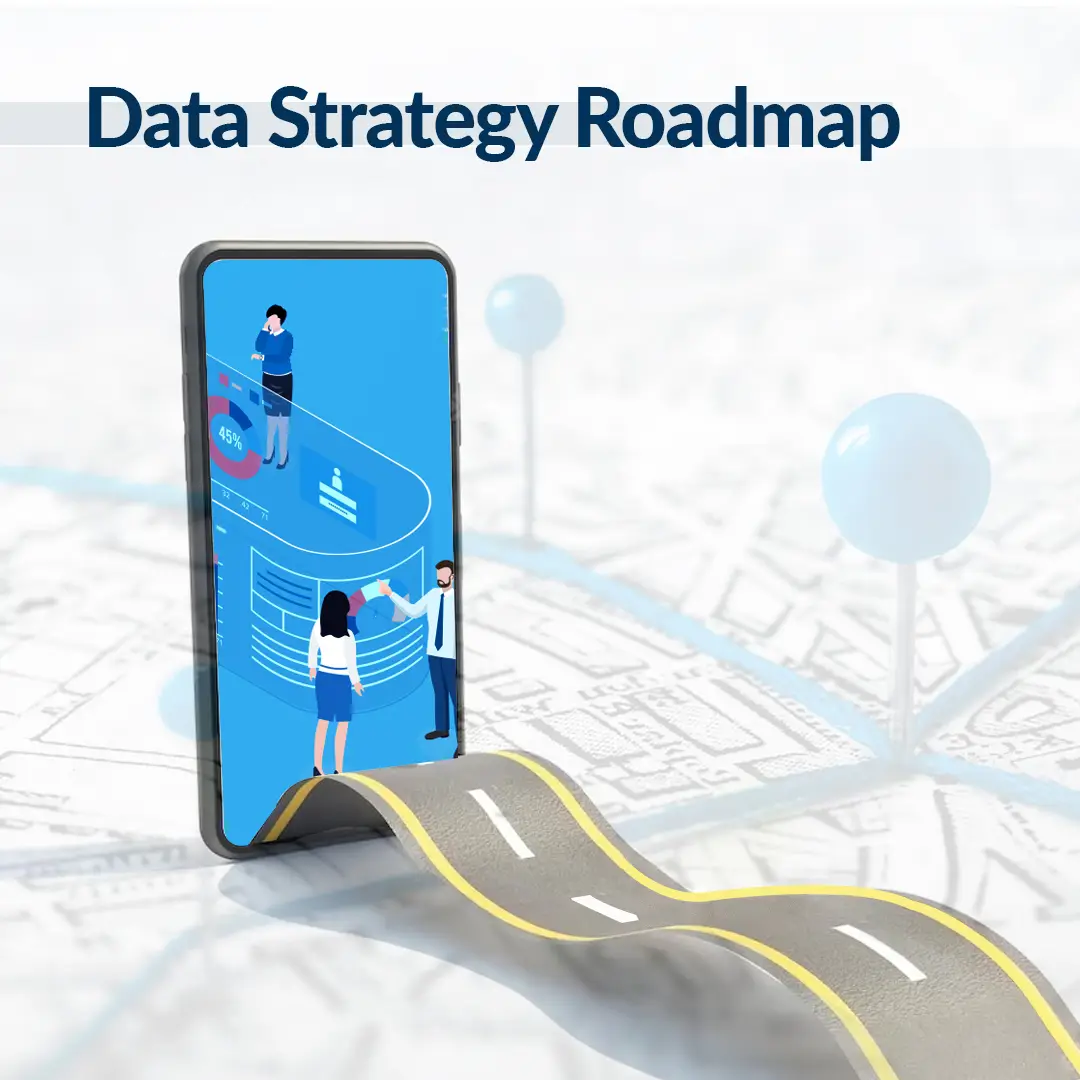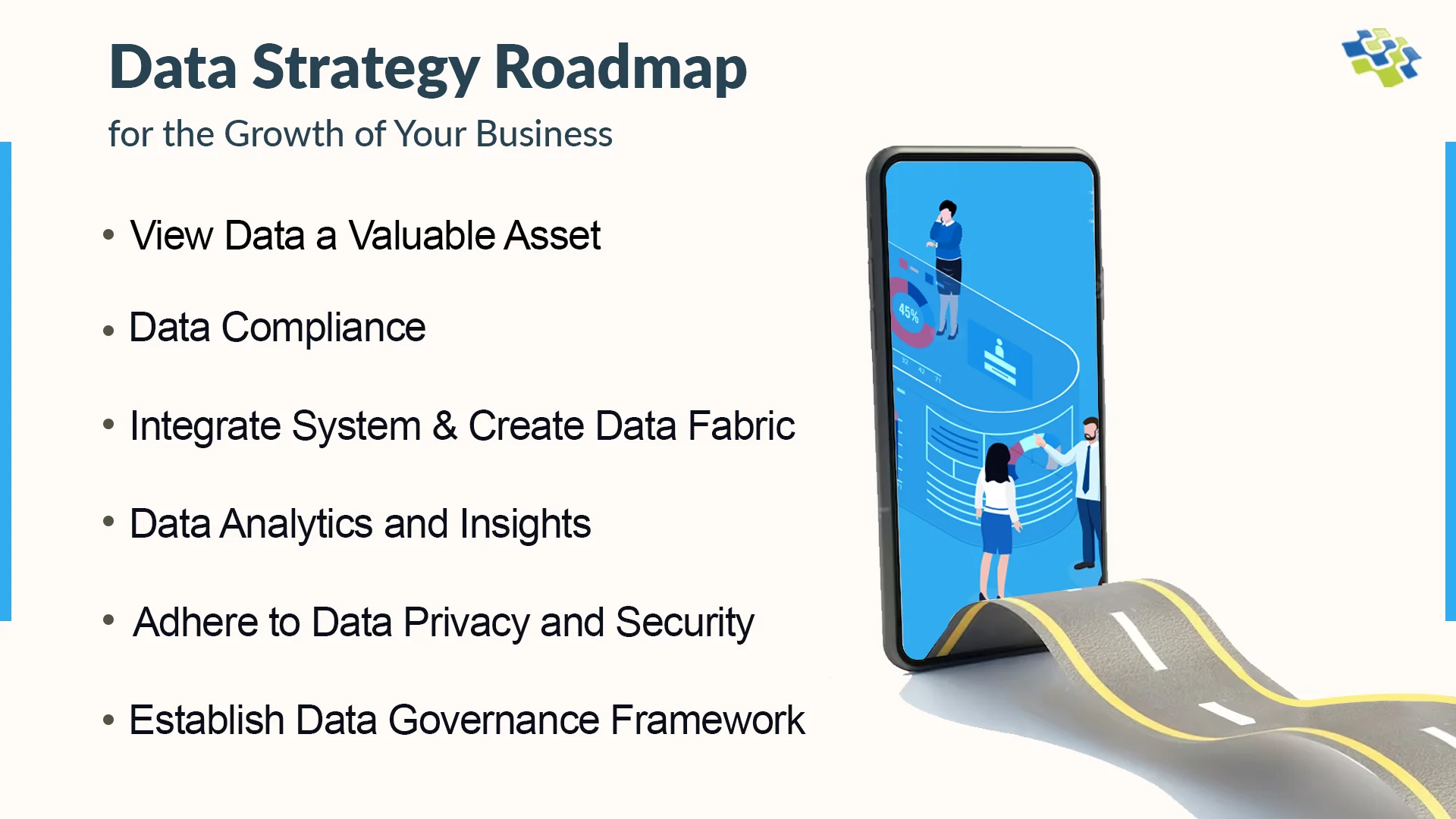Data Strategy Roadmap for the Growth of Your Business
If your current approach to handling data isn’t yielding leads, revenue, and profitable deals, it’s time for a change. An ineffective data strategy roadmap can serve as a significant roadblock to achieving business success in today’s data-driven transformation roadmap world.

“Analytics and big data have gained prominence in corporate data strategies, poised to transform business operations akin to the 1990s overhaul. As data-driven approaches gain momentum, they’ll increasingly shape competitive advantages in the corporate landscape.”- Mckinsey
Data Strategy for Transformative Impact
A fundamental building block for a successful Data Digital Transformation Roadmap journey lies in having a well-defined data strategy that aligns with digitalization goals. This strategy serves as a critical roadmap for crafting a successful data strategy plan, a vital component of IT modernization pursued by businesses. A robust data strategy roadmap outlines how an organization manages its data as a valuable, cross-functional asset that generates substantial economic benefits. This strategic approach not only shapes the DX strategy but also offers guidance and clear key performance indicators for evaluating and streamlining all data-related projects. A well-structured data strategy roadmap ensures that data becomes a powerful tool in driving digital transformation, aiding in achieving business objectives efficiently while maximizing the value derived from data assets.
Why is a Data Strategy Important?
A comprehensive data strategy is essential to extract maximum value from your data resources and ensure they align seamlessly with your business objectives. Regardless of your company’s orientation toward innovation, the drive for enhanced user productivity, or the pursuit of competitiveness, a well-crafted data strategy is the catalyst. Without a carefully devised plan, common data challenges may emerge, jeopardizing your organization’s ability to innovate, thrive, and compete effectively.
Further Read: Why Businesses Need a Powerful Data Strategy? 6 Ultimate Reasons
Data Strategy Roadmap Milestones
A data strategy roadmap typically consists of a series of milestones that an organization plans to achieve to effectively manage and leverage its data assets. The specific milestones will vary depending on the organization’s goals, industry, and current data maturity level.
 1. View Data as a Valuable Asset
1. View Data as a Valuable Asset
In the era of strict data regulations like GDPR and BCBS 239, individual data is a precious resource that demands careful handling and protection. This data holds immense potential for tailored user experiences and precise business decisions, enabling legal trading and sharing. Just as we manage human resources, processes, and technology, data requires categorization and governance. To kickstart a data management strategy roadmap, begin by Defining Clear Objectives that outline specific outcomes and advantages achievable through proficient data management. Ensure these Goals Align seamlessly with overarching business objectives, making data efforts an integral part of overall success. Next, create a comprehensive Inventory of your Data Assets, specifying their types, sources, and locations. Finally, conduct a thorough Data Quality Assessment to ensure accuracy, consistency, and reliability, enabling confident, data-driven decisions that drive business growth. This holistic data strategy approach lays the foundation for a thriving, data-powered enterprise.
2. Integrate System & Create Data Fabric
To navigate the intricate terrain of data strategy, businesses must focus on two core elements: Data collection and integration and Data access and sharing. According to Gartner, a staggering 87% of organizations struggle with effective data integration. The initial phase, Data Collection & Integration, involves gathering data from diverse sources and seamlessly unifying it. This ensures accuracy and accessibility for analysis, yet 65% of businesses grapple with this stage. Subsequently, Data Access & Sharing requires establishing a secure and efficient mechanism for users to access and collaborate on data. Shockingly, only 32% of organizations excel in this aspect. Prioritizing these pillars is imperative for thriving in today’s data-driven landscape, forming the foundation of a successful data strategy roadmap.
3. Data Compliance
In the comprehensive realm of a data strategy roadmap, data compliance stands as a crucial pillar. Recent data breaches have led to staggering costs, with the average cost of a data breach reaching $4.24 million. To mitigate such risks, businesses must adhere to a Robust Data Compliance Framework. This entails several key elements, starting with data documentation – a meticulous process of cataloguing data sources, classifications, and usage. Next, Data Retention & Purging govern how long data is stored and when it should be responsibly disposed of, aligning with regulatory requirements. Additionally, Data Disaster Recovery ensures that robust protocols are in place to safeguard data in unforeseen circumstances, minimizing downtime and data loss. In today’s regulatory landscape, prioritizing data compliance is not just a best practice; it’s a strategic imperative for businesses aiming to protect their assets and reputation while navigating the data strategy landscape effectively.
4. Data Analytics & Insights
Within a data strategy roadmap, data analytics and insights are the guiding stars. They enable organizations to navigate the data-driven path, turning raw data into valuable advantages through advanced analytics. The journey commences with Performance Metrics, providing benchmarks for tracking data goals and measuring success. Fostering a Data Culture is equally vital, embedding a mindset where data is prized, shared, and integrated into daily operations. Lastly, Data-Driven Decision Making empowers teams to make informed choices, boosting efficiency and innovation. By incorporating these components, businesses can fully tap into data’s potential, driving growth and staying ahead in the data-centric landscape.
5. Adhere to Data Privacy & Security
In a highly interconnected digital landscape, safeguarding sensitive information is both a legal obligation and a trust-building necessity. To achieve this, businesses should adopt advanced encryption techniques, access controls, and data anonymization methods to shield data from unauthorized access and breaches. Moreover, compliance with data protection regulations like GDPR and CCPA. Regular audits, vulnerability assessments, and incident response planning should be integral components of the strategy to proactively identify and mitigate potential risks. Robust data privacy and security measures not only protect against financial and reputational damage but also foster customer confidence and enable businesses to leverage data for strategic decision-making with peace of mind.
6. Establish Data Governance Framework
Establishing a robust data governance framework entail creating a systematic framework that governs data across the organization. A data lifecycle management system defines data ownership, access controls, and data quality standards. This framework ensures that data is treated as a valuable corporate asset, fostering trust, accountability, and compliance. To simplify, it’s like setting up rules and guidelines for how data is handled within your company. Think of it as a blueprint that outlines who can access what data, how data is stored securely, and how data quality is maintained. This governance framework evolves through Regular Reviews & Iterations, ensuring it remains aligned with data strategy business goals. Effective Communication & Stakeholder Engagement are vital components, as they facilitate collaboration and buy-in from all involved parties, leading to data-driven success.
Pursuing Strategies with Data Analysis
In your business endeavors, it’s crucial to establish measurable Key Performance Indicators (KPIs) derived from data and analytics strategy & roadmap. However, this task is more intricate than it may seem. A single business inquiry can generate numerous data streams essential for analysis. For example, to assess your company’s profitability, you must delve into pivotal elements like sales, Cost of Goods Sold (COGS), and expenses. To gain a comprehensive understanding of the intricate web of factors contributing to profitability, each of these data sources demands further deconstruction.
The aim of crafting a data strategy is to identify all the necessary inputs required to calculate significant metrics and seamlessly integrate them into your operational processes. This approach ensures that every business objective is underpinned by tangible, data-driven insights, enabling you to track progress effectively and make informed decisions to drive success.
Further Blog: Data Security- An Overview of GCP’s Key Management Systems (KMS)
Conclusion
A meticulously designed data strategy roadmap serves as your North Star for business expansion. It steers you through the data collection, analysis, and application processes, guaranteeing informed decision-making. Beyond mere data accumulation, the focus is on extracting meaningful insights. Through robust data governance, active stakeholder involvement, and continuous refinement, you lay a solid foundation for a triumphant journey toward data-driven prosperity.
Ready to supercharge your data strategy?
Contact us today for a personalized consultation and take your business to the next level.
Stay In the Know
Get Latest updates and industry insights every month.
 1. View Data as a Valuable Asset
1. View Data as a Valuable Asset